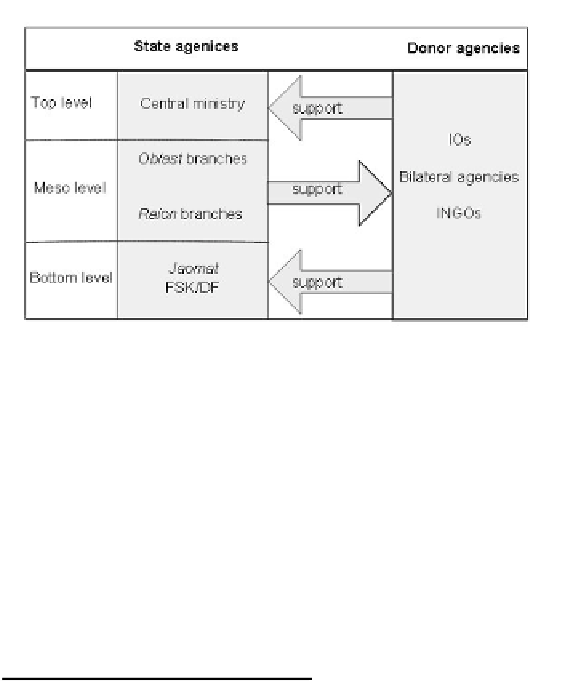Environmental Engineering Reference
In-Depth Information
transparent, corrupt, and non democratic. Their consequence is, however, no to direct special
reform efforts to the reform of water administration. On the contrary: They try to avoid work
ing with the state administration. They only cooperate with the central level concerning deci
sion making processes and cooperation agreements. When it comes to concrete projects and
their implementation, they in general avoid the meso level and prefer to work with non state
actors instead.
290
It is excluded from reform activities and from access to grants and loans.
While it is sporadically included in training and capacity building activities, it is not systemati
cally supported (e.g. with WUA support departments as in the CFPS projects).
This marginalized situation is reinforced by the fact that many qualified experts leave the
water administration and accept alternative, better paid job opportunities in donor agencies
(Bucknall et al. 2003: 4; UNDP 2003: 25f)
291
. Therefore, I will argue that the mode of donor
state interaction even tends to weaken the water administration, especially at the meso level.
Figure 13 illustrates how the meso level of water administration, instead of being the object of
reforms and receiving support by donors, actually supports them.
Figure 13: Interaction between donor and state agencies
Source: own compilation.
A sort of 'brain drain' exists from state to donor agencies. This brain drain is certainly more
complex than on an international level and has its positive effects as well: those experts still
work for their country and guarantee that international projects include national expertise. Yet
national professionals are seldom consigned with the development of the project but rather
with its implementation. In addition, those projects are generally perceived as 'foreign' projects
and are therefore characterized by a lack of ownership, low feedback, and limited learning
effects for the state agencies. Qualified professionals working for donor agencies are missing in
the
MinVodKhoz
, its branches on
oblast
and
raion
level (
OblVodKhoz
and
RaiVodKhoz
), and in
WUAs: “There are no experts (…). There, where experts should work are none. No water
290
There are also exceptions. The IWRM Fergana project (of SDC, IWMI and NIZ-MKVK) e.g. involves the Sughd
OblVodKhoz
(Author's interview with director of
OblVodKhoz
, Khudjand, 09/02/2004).
291
Author's interview with an NGO representative, Dushanbe, 08/25/2004, with a
RaiVodKhoz
director, Sughd
Oblast, 09/01/2004.


Search WWH ::

Custom Search